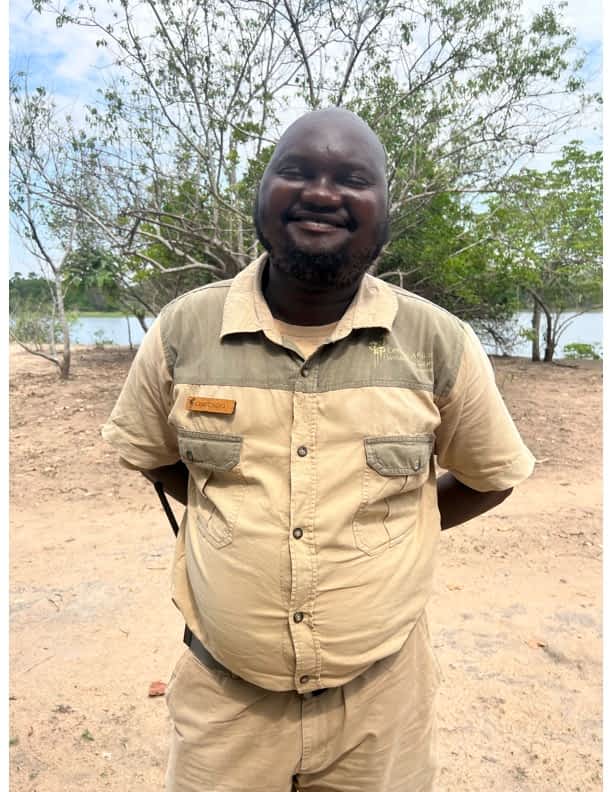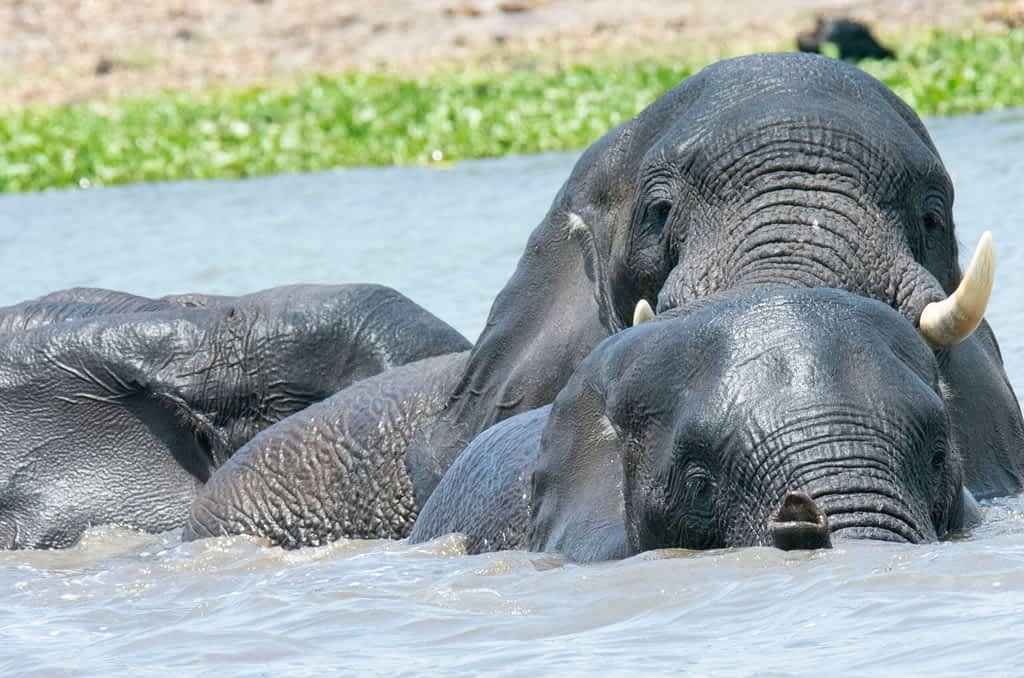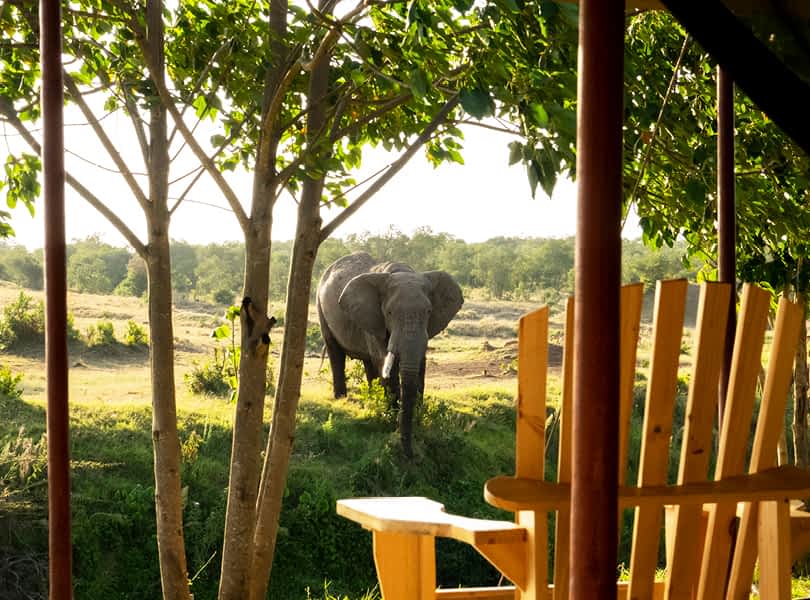Liwonde National Park, in the heart of Malawi, has transformed under African Parks care since 2015. Land once besieged by poaching to a thriving park, where diverse wildlife, including rare species, flourish alongside the Shire River. And an uncrowded safari experience for visitors. It’s a story of revival, hope, and the enduring spirit of Malawi’s wilderness.
Staying at Mvuu Lodge, the wildlife wanders freely, I experienced exceptional service, delicious meals, and a range of activities from boat safaris on the Shire to night safaris seeing nocturnal, and cultural activities that bring you closer to local heritage, all enriching my connection to this unique place.
Meeting Chifundo Nyambalo, my expert safari guide was a standout moment. Rising from a life marked by struggle and the hard realities of Malawi, Chifundo’s journey to becoming a guiding light in Liwonde is as inspiring.

Q: How did you become a safari guide?
Chifundo: “I maintained the grass and also did some plumbing. My hard work and a keen interest in becoming a guide caught the attention of Central African Wilderness Safaris. They provided me with a scholarship and a chance to pursue guiding. I would join senior guides, taking the spotter’s seat, and every trip was a learning opportunity, from self-study to learning from the others. The company even arranged training with FGASA so we received formal education in guiding, starting from level one and advancing. My training included a trip to Kruger National Park in South Africa and attending the The wildlife college . It was my first plane ride, and everything was just wow. That trip opened up a world of learning for me. Honestly, I never imagined I’d end up as a guide.”
Q: Why?
Chifundo: “You know, that’s a good question. In this area around here, when the National Park was under government management, we experienced too much human-wildlife conflict.”
Q: Because there was no fence?
Chifundo: “We had a fence, but elephants kept pushing it down. The government never maintained it. It wasn’t a nice fence like now. Every single night, the elephants, hippos, and other animals were getting out. So instead of sleeping at night, we ended up sleeping during the day.”
Q: Because you were scared?
Chifundo: “No, not because we were scared. But at night, we needed to chase away the elephants. We had to make a fire and beat a drum to make noise and scare them off. So, it was very hard.”
Q: Were you living in a village nearby?
Chifundo: “Yes, I used to live right here.”
Q: What’s the name of the village?
Chifundo: “Ligwangwa village.”
Q: How far is it from the park?
Chifundo: “It’s about 5km away, but elephants roam much further. Those times were tough. In our family home, we had many fruit trees—mangos, bananas, and papayas. We had to cut them down every single night; we couldn’t sleep because the elephants would come into our village. People started resenting the park, wondering why we couldn’t just grow vegetables instead of having the park, as it seemed meaningless to us.””We depend on maize as our staple food. We’d grow it, and just when it was ready to harvest, elephants would destroy everything. When you have five, six, or seven children to feed, it’s devastating, and the government offered no compensation, nothing. Now, things have changed; in my community, I’ve become a role model. It’s something people find hard to believe—how Chifundo became a guide. It’s a path I never imagined for myself.”
Q: In your opinion, what makes you a good guide?
Chifundo: “Being a good guide means being observant while driving or on a boat safari. We’re always on the lookout for animal tracks, droppings, and birds in the trees—they often give alarm calls when predators are nearby. Having a good eye for spotting animals is crucial.”
Q: Can you share what makes Liwonde National Park a must-visit?
Chifundo: “Though we’re not known for the big five since we don’t have leopards, Liwonde is truly one of the best places to visit. What makes it unique is our river that flows all year round, attracting animals to its banks. The opportunity for boat safaris offers a completely different experience. You can witness the beauty of sunrise and sunset from the water. The park is diverse, with a variety of landscapes like floodplains, woodlands, and grasslands, making it stunningly beautiful and varied.”
Q: Do you have a lot of animals here as well?
Chifundo: “Yes, there are lots of animals here. While we do face some poaching, it’s not prevalent, allowing the wildlife to thrive. Liwonde serves as a vital breeding ground; many animals you see in Majete Wildlife Reserve originate from here after their populations were decimated. We’ve been actively relocating animals to rejuvenate other parks in Malawi. Thankfully, poaching is minimal, and the animals are doing very well.”
Q: Does community involvement play a big role in the park’s success?
Chifundo: People are now understanding, that there is now no human-wildlife conflict, animals rarely get out, maybe once in a blue moon, so people are still happy they can even grow their crops, even five meters from the fence, that could not have happened five or ten years ago. They understand we need to protect this is important to us
Q: How does the community benefit?
Chifundo: After some time different projects started, because of tourism and donors, schools and hospitals are being built, I remember when I used to walk more than ten kilometers when I was six years old to go to school.
Q; Each way?
Chifundo: “Yes, with my sisters, but now every three to five kilometers there is a school, which is completely different from what it used to be. We also help the people in the immediate area we have a catchment area of about 10km from the fence, and they get help, it’s important to have a good relationship, we help with jobs, schools, and hospitals. One of the organizations that help get children scholarships is Children in the Wilderness.”

Pack for a Purpose: A few extra pens and pencils for local communities can make a big difference.
Packing for an African safari is about striking the perfect balance between being prepared and traveling light. With this guide, you’re not just ready for an adventure; you’re set to make memories, tread lightly on the earth, and leave a positive impact. Remember, the best parts of a safari aren’t the things you bring but the experiences you have and the stories you’ll tell. So pack wisely, laugh often, and embrace the wild heart of Africa.
Why Choose King Salama Safaris?
Eco-Friendly Practices: We are committed to sustainable tourism, ensuring that your adventure leaves minimal impact on the environment.
Expert Guides: Our knowledgeable guides provide a deeper understanding of wildlife and ecosystems, making your safari educational and immersive.
Luxury in the Wilderness: Experience the perfect blend of luxury and nature, with eco-conscious accommodations that redefine safari comfort.
Don’t Just Dream It… Live It!
King Salama Safaris expert team is here to ensure that you have the best safari. We are here to listen and craft the perfect trip. From the minute you book with us until we say goodbye to you at the airport, we are with you all the way.



















